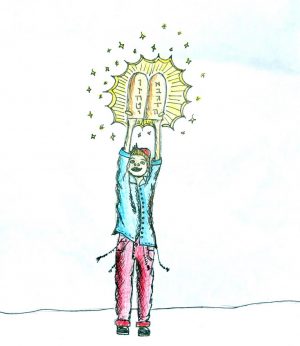DVAR TORAH: Goodness is a commandment, not an option
May 17, 2018

By Sharon Khalil, 11th grade
Recently in my Tanach class with Rabbi Schwarzberg, we debated the following question: Is not doing good, while not being bad, a sin? We were discussing this in the context of the story of S’dom, a city God intended to destroy for its people’s sins. Most people are familiar with the story of Avraham and welcoming three strangers into his home, but many are not very familiar with the narrative that follows.
Three angels arrive at the city of S’dom, and Lot is quick and eager to invite them to stay in his home. The people of S’dom then come and say to Lot, “Where are the men who came to you tonight? Bring them to us and we will get to know them.”
What does “get to know them” mean?
The Hebrew in the verse is v’ned’a otam. Rashi, the Ibn Ezra and Rashbam all interpret this to mean rape or sodomy. The Ramban, however, takes a different approach, saying that the sin of S’dom was actually the people’s failure to help the needy, poor and vulnerable.
Ramban’s interpretation implies that not doing the righteous thing is as bad as or worse than doing that bad act, or at least it warrants the same response from God. At first I thought this couldn’t be true. How could God wipe out a city just because they kept to themselves? Surely they must have done something terrible.
Thinking about this, I noticed a possible answer in Parshat Kedoshim. In Kedoshim, Hashem lists a number of mitzvot for Bnei Yisrael to take upon themselves, several of which have to do with chesed, or acts of kindness. God says you should not stand idly by the blood of your neighbor and you should love your neighbor as you love yourself.
When we are kids we are taught that all these things are good deeds that we should do. They are mitzvot, and a mitzvah is a good deed. But a mitzvah really holds so much more strength.
A mitzvah is a commandment from God, and in Parshat Kedoshim God explicitly commands us to help others
and be kind to them. This establishes that doing the right thing or being charitable is not just something that is preferable, it is something you ought to do.
So the people of S’dom may not have been terrible for allowing others to hurt, but they definitely weren’t innocent either.
A person may do everything right halachically – keep Shabbat, keep kosher, daven three times a day, and so on – but still not be a religious person. Such a person forgets that kindness, too, is a commandment, and it is one that is so important.
You have to remember the purpose and meaning behind your actions, to help other people and to be the best person that you can in actions towards others. This principle runs throughout the Torah, in Bereishit and Vayikra and every place in between. It is a cornerstone of our understanding of God’s will, and of our religion.












